The public prefers President Obama’s approaches to those of congressional Republicans on several of this year’s major policy issues. However, Obama’s advantages are narrower on gun policies and the budget deficit than on immigration and climate change.
Overall, 45% say Obama has the better approach in dealing with gun policies, compared with 39% who favor Republicans in Congress on this issue. While Republicans overwhelmingly
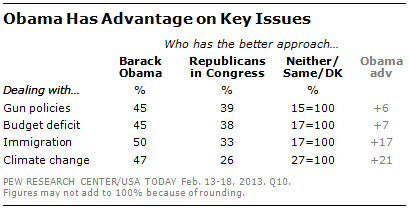
favor GOP members in Congress (76%) and Democrats support Obama (79%), independents are divided: 42% say congressional Republicans have a better approach, while 39% think Obama has a better approach.
Opinions are comparable about whether Obama (45%) or congressional Republicans (38%) have a better approach to the deficit. Again, independents are split: 39% favor Obama while 38% prefer congressional Republicans.
Obama holds wider leads among the public for having a better approach to immigration (50% to 33%) and climate change (47% to 26%). Independents prefer Obama’s approach to congressional Republicans’ on both issues (46% to 33% on immigration; 42% to 26% on climate change).
Obama’s approach on immigration is widely favored by Hispanics: 73% say Obama has a better approach on immigration, compared with just 15% who prefer congressional Republicans. Blacks support Obama by about the same margin (77% to 13%). But opinions are divided among whites – 39% say Obama has a better approach, compared with 42% who favor congressional Republicans.
Most Say Action on Deficit Is Essential This Year
There is broad agreement that major legislation to reduce the federal budget deficit is essential this year. Seven-in-ten (70%) express this view, including 81% of Republicans, 70% of independents and 65% of Democrats. And when it comes to the focus for the next steps in deficit reduction, about three-quarters of the public (76%) say that the president and Congress
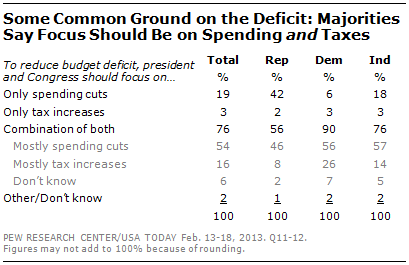
should focus on a combination of both spending cuts and tax increases; just 19% say the focus should only be on cuts and 3% say it should only be on taxes.
Across all three partisan groups majorities advocate an approach that includes both spending cuts and tax increases, although Republicans (56%) are less likely than independents (76%) or Democrats (90%) to say this; 42% of Republicans favor an approach that would only include spending cuts.
Those who favor a combination of spending cuts and tax increases were asked which should receive greater focus. Most of those who favor a mixed approach say the focus should be primarily on spending cuts (54% of the public overall). Just 16% of the public say the focus should mostly be on tax increases.
Nearly nine-in-ten Republicans (88%) say deficit reduction should be achieved either only with spending cuts (42%) or mostly through cuts (46%). Just 6% of Democrats say deficit-reduction efforts should concentrate solely on spending cuts. But an additional 56% of Democrats say the focus should be mostly on spending cuts.
Little Awareness of Budget Sequester
While the public views deficit reduction as an urgent matter, the approaching deadline for major cuts in government spending – the so-called budget sequester – has not registered widely.
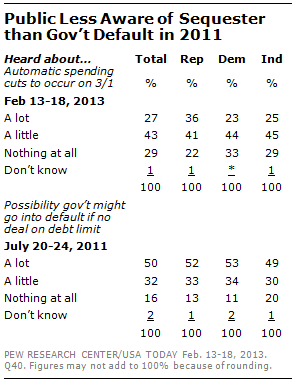
With a little more than a week to go before the March 1 deadline, there is only modest public awareness about the major cuts in defense and domestic government spending automatically scheduled to go into effect.
Only about a quarter (27%) of Americans have heard a lot about these cuts; 43% say they have heard a little, while 29% have heard nothing at all. By comparison, public attentiveness to the debate over raising the debt ceiling was far greater in July 2011. In a survey conducted July 20-24, 2011, about two weeks before the Aug. 2 debt ceiling deadline, 50% had heard a lot about the possibility of a government default.
There is also a partisan gap in attentiveness to the March 1 deadline; 36% of Republicans say they have heard a lot about the automatic spending cuts scheduled to take effect, compared with just 23% of Democrats and 25% of independents. And awareness is particularly high among Republicans and Republican-leaning independents who agree with the Tea Party movement, nearly half of whom (48%) say they have heard a lot about the possible sequester.
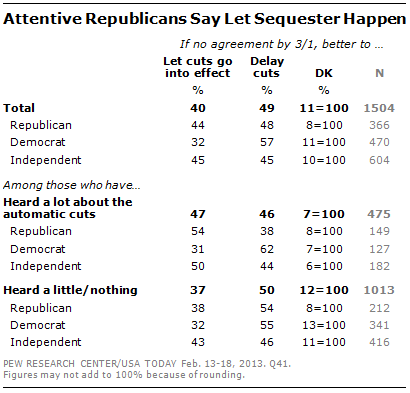
If the sequester deadline is reached without a deficit agreement between the president and Congress, there is somewhat more support for delaying the cuts than for letting them go into effect (49% vs. 40%). The majority of Democrats (57%) say the cuts should be delayed in this case, while both Republicans and independents are more evenly divided.
Those who say they have heard a lot about the potential spending cuts are more supportive of letting them take effect (47%) than those who have heard little or nothing about the issue (37%). About half (54%) of Republicans who have heard a lot about the possible sequester say the cuts should go into effect in the absence of a deficit agreement; that compares with 38% of less attentive Republicans. There are no
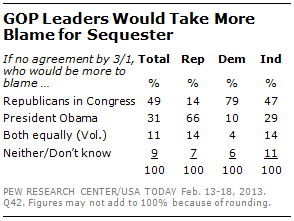
significant differences by attention among either Democrats or independents.
Overall, 49% would mostly blame GOP leaders if no deficit reduction agreement is reached by the March 1 deadline. Just 31% would mostly blame Obama, while 11% volunteer that both would be equally to blame.
Immigration: Less Support for Enforcement as Policy Priority
A quarter of the public says the priority for dealing with illegal immigration should be better border security and stronger enforcement of immigration laws. The same percentage (25%)
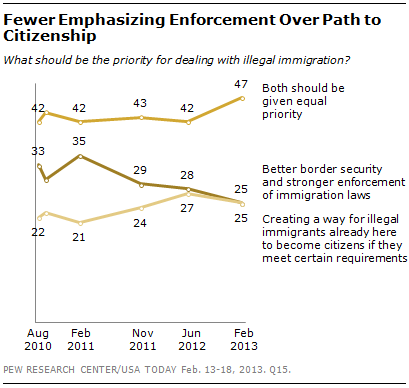
says the priority should be creating a way for illegal immigrants already here to become citizens if they meet certain requirements.
Far more (47%) say both should be given equal priority. That has increased from 42% two years ago, while the percentage saying stronger border security should be the priority has declined from 35% to 25% today.
Fewer say it is essential for the president and Congress to act on immigration this year than say that about the budget
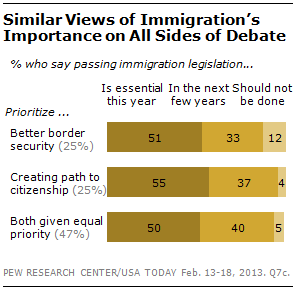
deficit. Yet 51% say passing major immigration legislation is essential to do this year and another 37% say it should be done in the next few years.
The plurality view, even among groups with different views about illegal immigration, is that major immigration legislation should be enacted this year. About half (51%) of those who say better border security should be the priority think it is essential to pass major immigration legislation this year, as do 55% who prioritize creating a path to citizenship. Similarly, 50% of those who say both should be given equal priority think passing legislation is essential this year.
A plurality of whites (45%) and 58% of African Americans say that increased border security and enforcement of immigration laws and
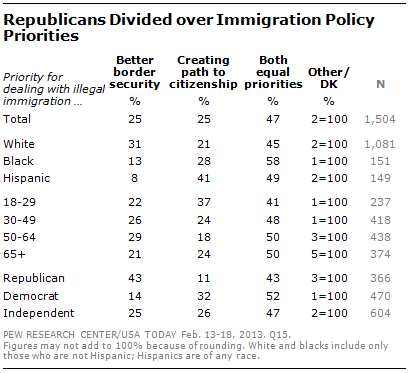
creating a path to citizenship should be the priority for dealing with illegal immigration.
Among Hispanics, 41% say creating a path to citizenship should be the priority. About half (49%) say a path to citizenship, along with better border security and stronger enforcement, should be the focus for dealing with illegal immigration.
A majority of Democrats (52%) and 47% of independents think that both enforcement and creating a path to citizenship should be given equal priority. Republicans, by contrast, are divided between prioritizing better border security and enforcement (43%) and both improved enforcement and creating a path to citizenship (43%).
Gun Control: Little Change in Opinions
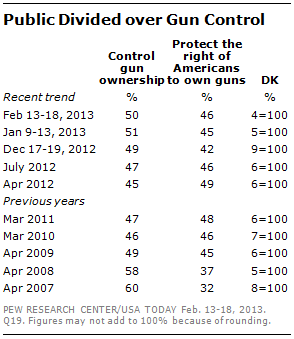
Public opinion shifted modestly toward support for gun control in the immediate aftermath of the school shooting in Newtown, Conn. on Dec. 14. Since then, there has been very little change in public attitudes toward gun control. Currently, 50% say controlling gun ownership is more important, while 46% prioritize protecting the right of Americans to own guns.
Significant partisan and demographic differences remain over this issue. About three-quarters of Republicans (74%) say protecting gun rights is more important, while 73% of Democrats say gun control is more important. Independents are about evenly divided (50% protect rights, 47% control ownership).
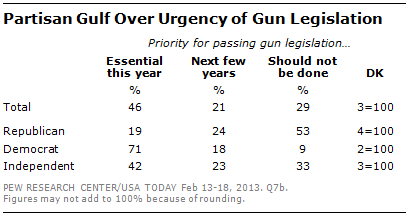
Republicans and Democrats are also divided over the importance of passing major legislation about gun policies. Fully 71% of Democrats say it is essential for Congress and the president to act on gun legislation this year, while an additional 18% say it can be done in the next few years; just 9% of Democrats say it should not be done. By contrast, a narrow majority of Republicans (53%) say no action should be taken at all on gun legislation.
Three policy options currently at the forefront of the debate over gun policy – background checks, banning assault-style weapons, and banning high-capacity ammunition clips – all receive more public support than opposition. Background checks for private sales and gun shows are particularly popular: 83% of Americans favor this, including large majorities across all major demographic and partisan groups.
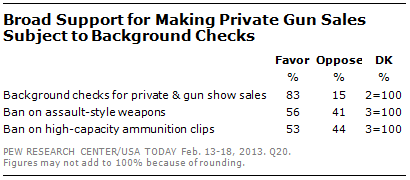
Smaller majorities of Americans say they favor a ban on assault-style weapons (56%) and a ban on high-capacity ammunition clips that hold more than 10 bullets (53%). There are substantial partisan divisions over both proposals: 71% of Democrats favor a ban on assault-style weapons, compared with 52% of independents and 43% of Republicans. The partisan pattern is similar in opinions about a high-capacity ammunition ban.
Climate Change: Public Favors Stricter Emission Standards
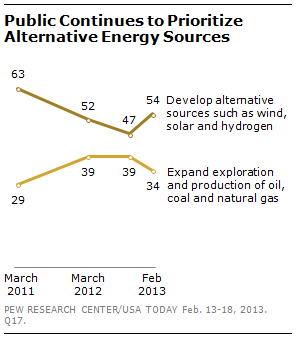
By a 54% to 34% margin, more Americans say the priority for addressing the nation’s energy supply should be developing alternative energy sources, such as wind, solar and hydrogen, over increased production of oil, coal and natural gas. Since 2011, the public has prioritized alternative sources over expanding production. Last October, the gap had narrowed: 47% said the priority should be developing alternative sources while 39% said the focus should be on expanding oil, coal and natural gas.
Further, fully 62% favor setting stricter emission limits on power plants in order to address climate change while 28% oppose this. Those who favor stricter emission standards are far more likely to want new climate change policies this year. Nearly half (46%) of those who favor stricter emission standards say new climate policies are essential this year. That compares with just 15% of those who oppose stricter emission standards; 41% of whom say new climate policies should not be done at all.
There are strong partisan divides over the country’s energy priorities and setting stricter emission standards. Only a third of Republicans (33%) say the priority should be developing alternative sources, while 54% say expanding production of oil, coal and
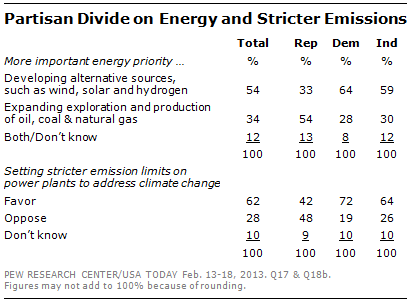
gas should be the focus. The pattern is reversed among Democrats and independents, with far more saying developing alternative sources should be the priority.
By large margins, Democrats and independents also favor stricter emission limits on power plants in order to address climate change (72% and 64%, respectively). By contrast, Republicans are divided; 42% favor stricter emission standards while 48% are opposed.
There are stark age differences over energy policy priorities. Fully 71% of those younger than 30 give greater priority
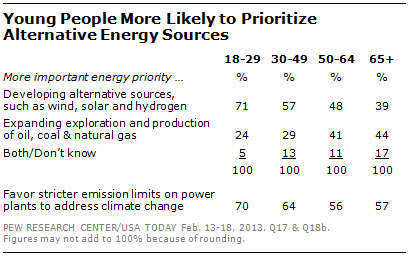
to developing alternative sources, while just 24% prioritize increased production of oil, coal and gas.
Opinion among older age groups is more divided. Just 39% of those 65 and older prioritize developing alternative sources while 44% say expanding production of oil, coal and gas should be the priority. Age differences are more modest in views of stricter emission limits on power plants to address climate change. Majorities across all age groups, including 70% of those under 30, favor this proposal.




